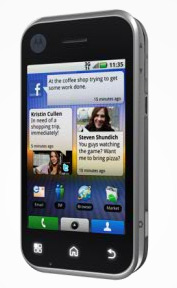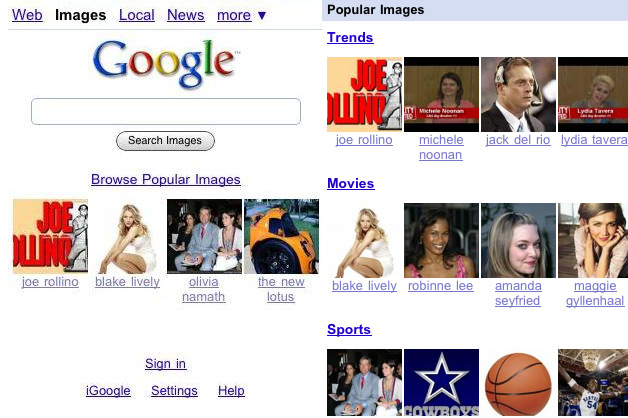Google made a couple of interesting comments at a mobile marketing and advertising event in Vegas. Michael at Mobile Marketing Watch reports that Diana Pouliot – Director of Mobile Advertising at Google says a third of all Google searches via the mobile web pertain to some aspect of the searcher’s local environment.
In addition, Google Mobile Ads Group Product Manager Paul Feng reportedly said, "We think of location as a hugely important signal."
How important is location to relevance? Discuss here.
So just how important of a signal is location to Google? Feng may have been talking about ad relevance specifically, but we know it plays some role in organic search. Otherwise, people would not get different search results based on where they are, which has been the case for some time. Perhaps the real question is whether location will start carrying more weight as searchers increasingly turn to their mobile devices for a greater percentage of their queries.
Location is already playing a significant role in the way people are searching on their mobile devices, and not just with search engines. WebProNews had an interesting discussion with RateItAll President Lawrence Coburn at the Online Marketing Summit last month about how consumers sharing their location has in essence become a new way of sending out a generic query, one that is becoming more prevalent with the growing popularity of location-sharing services like Gowalla and Foursquare.
"The thing about Foursquare and Gowalla, and these check-in apps, is like, a single tap of your phone is a powerful piece of data. It creates a connection with the merchant (with a bar or a restaurant) that you’re at," explains Coburn. "It tells your friends where you are, and then in the aggregate, it tells the services like Foursquare and Gowalla what places are hot. And then you can imagine, like a local coupon or a local ad network overlaid on top, where a business is having a slow Tuesday, and they can blast out to everybody in their neighborhood, and say ‘hey, we’re doing half off beers in our place RIGHT NOW,’ and they can decide that on the fly, and reach a community that’s right around them."
Despite apps like these, Twitter now has location features, and Facebook is expected to have some very soon. That has to be considered a whole new ballgame, not only because of the popularity of these social networks, but their relationships with the search engines. The social networks are already becoming more integrated into search results through real-time search, as well as social search (not to mention the web in general through Facebook Connect, APIs, etc.). Given Google’s fondness for delivering relevant results and an increased rate of user location sharing, it’s hard not to imagine location becoming more of a factor in search than ever.
In recent months, Google has already begun placing a great deal more emphasis on location than it has in the past. For example, last month, the search engine added a new search option to its list, called "nearby." This lets users filter their results based on either their default location or a custom one.

"Location has become an important part of the way we search. If you’re a foodie looking for restaurant details, food blogs or the closest farmer’s market, location can be vital to helping you find the right information," said Product Manager Jackie Bavaro of the feature. "One of the really helpful things about this tool is that it works geographically — not just with keywords — so you don’t have to worry about adding ‘Minneapolis’ to your query and missing webpages that only say ‘St. Paul" or "Twin Cities.’"
Another example of Google’s recent emphasis on location would be the tailoring of search suggestions to user location, a feature introduced in January.
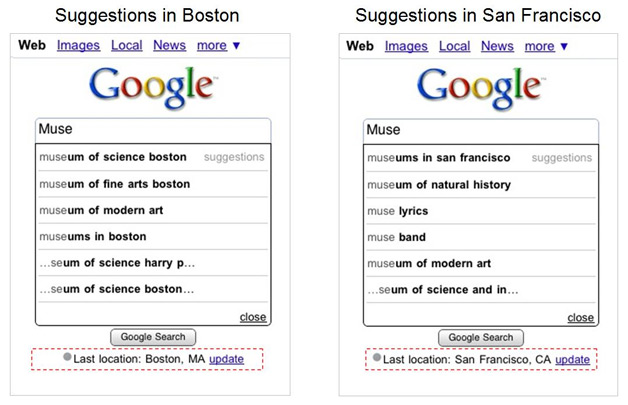
On the advertising side of things, Google is already targeting ads based on location. The company even released ads with click-to-call phone numbers recently.
Google is optimistic that ad rates may beat the desktop standard in time. "We hope and believe that there’s even a chance that we could exceed desktop in the future," Google’s Vic Gundotra reportedly said last week. Location information will no doubt play a significant role in the quest for achieving such a goal. The fact of the matter is that location makes targeting easier in many cases, and location is much more of a factor when it comes to mobile. Back to Google’s comments in Vegas, Feng is said to have hinted at Google working on improving ad formats soon, with features that would include "new forms of user interaction," including navigation.
Regardless of location’s role in search, businesses are already finding great benefits from users sharing their location information. Here are some things I mentioned in a previous article that you can do as a small business to stay ahead of the curve with regards to user-location sharing:
1. Keep up with what mobile apps are popular on the most popular devices
2. Study what makes these apps and their respective users tick.
3. Determine which of these has a functionality that your business can directly take advantage of
4. Verify your business at Google’s Local Business Center
5. Keep a close eye on what Google is doing in the local search space (there are frequent announcements that directly relate to this)
6. Keep a close eye on how Twitter users interact with geo features, particularly those who follow you
7. Definitely keep a close eye on Facebook announcements, looking for geo-related tidbits to drop
8. When using social media, include your business location in updates when appropriate, and promote offers (time-sensitive perhaps) that encourage nearby people to stop in (if you have a brick and mortar store) or meet for a quote at a nearby restaurant for example (be creative…without being too stalkerish)
Share other ideas here.
Is location part of your strategy for reaching customers through search? If you run an online business (as opposed to brick and mortar) do you think this will affect you? Share your thoughts on the subject.
 "Search is not where it’s at" on phones, Steve Jobs said recently to reporters at the NYT. "People are not searching on a mobile device like they are on the desktop."
"Search is not where it’s at" on phones, Steve Jobs said recently to reporters at the NYT. "People are not searching on a mobile device like they are on the desktop."
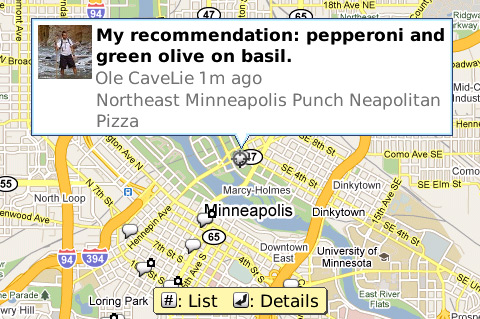



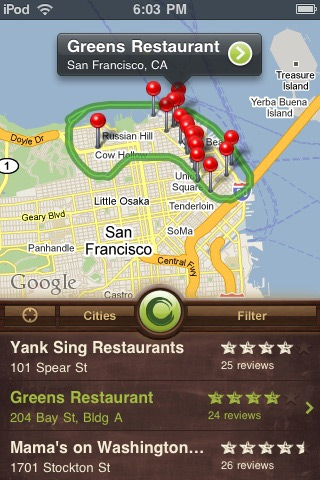
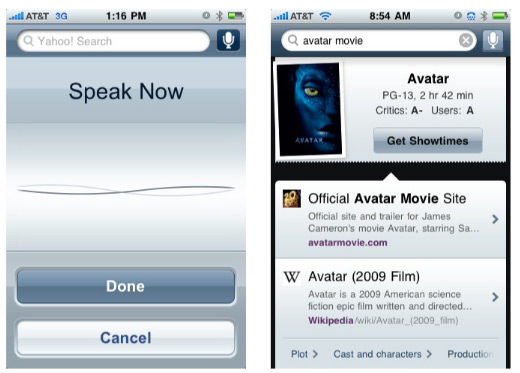
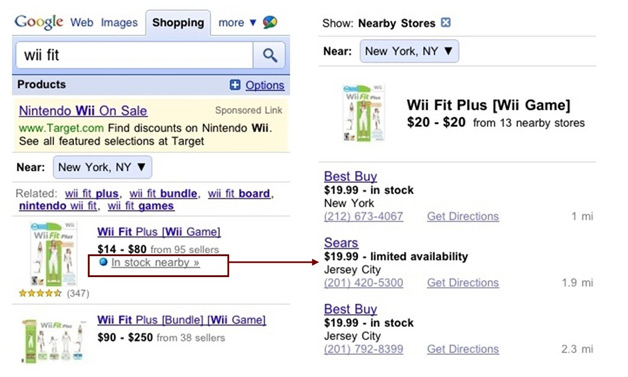
 As far as Google indexing and mobile sites goes, Google’s Matt Cutts says, "If you can find a way where your existing site will work well in mobile browsers, we’re not worrying about supporting two completely different sites."
As far as Google indexing and mobile sites goes, Google’s Matt Cutts says, "If you can find a way where your existing site will work well in mobile browsers, we’re not worrying about supporting two completely different sites." 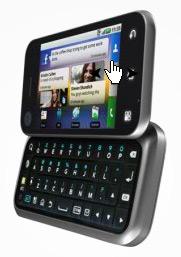 "We believe that consumer choice is one of the most critical components to ensuring a rich and seamless client experience," said Christy Wyatt, corporate vice president of software and services, Motorola Mobile Devices. "Motorola and Microsoft have enjoyed a longstanding collaboration and the addition of Bing services to our Android-based smartphones in China is another important step in empowering our end-users."
"We believe that consumer choice is one of the most critical components to ensuring a rich and seamless client experience," said Christy Wyatt, corporate vice president of software and services, Motorola Mobile Devices. "Motorola and Microsoft have enjoyed a longstanding collaboration and the addition of Bing services to our Android-based smartphones in China is another important step in empowering our end-users."
